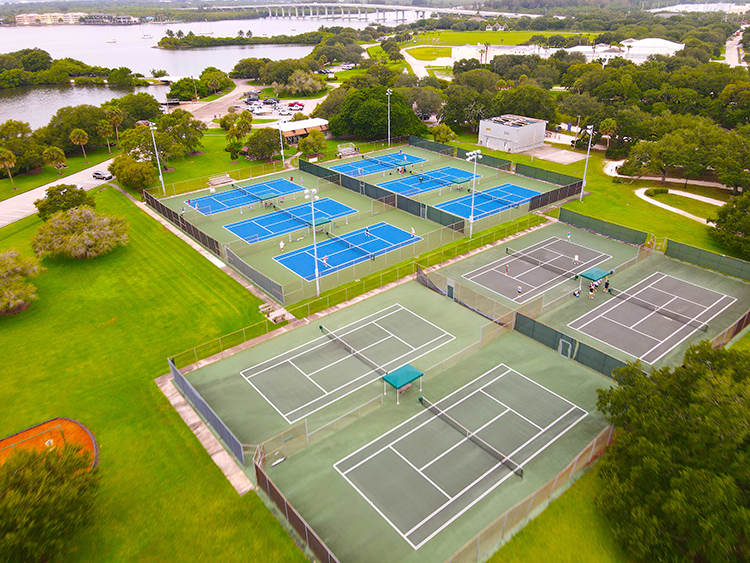
The Vero Beach City Council should reject the Recreation Commission’s wrongheaded recommendation to destroy the Riverside Park Tennis Complex.
Officially, the commissioners voted 3-2 earlier this month to recommend to the council that four of the city-owned complex’s 10 tennis courts be converted to as many as 12 pickleball courts.
But the result would be the same: Nobody wants to play tennis on courts adjacent to the repeated loud popping sounds of pickleball paddles hitting plastic balls and the noisy chatter that accompanies the game.
Converting four courts to pickleball would likely bring a lawsuit from unhappy neighbors, and end the city’s mutually beneficial arrangement with St. Edward’s tennis program – which practices and plays matches at the tennis center.
Worst of all, it would kill any realistic chance the Mardy Fish Children’s Foundation would push forward with its proposal to give the aging facility a facelift and transform it into something special – a first-rate tennis center worthy of our island community.
“It’s a big concern,” Fish Foundation Executive Director Lynn Southerly said of the potential impact on her organization’s plan to raise money to renovate, expand and beautify the hard-court complex, which it hopes to use for tournaments, exhibitions and other fundraisers, as well as for its youth programs.
The Fish Foundation’s plan – which includes construction of a clubhouse and natural amphitheater that would serve as a small stadium court, as well as refurbishing the courts and landscaping the surrounding property – was first presented to the city last year.
The foundation used a $30,000 grant from the United States Tennis Association to fund a site plan, artist rendering and cost estimates for the project.
The foundation, a charitable organization founded in 2007 by former top-10 tennis player and current U.S. Davis Cup Captain Mardy Fish, began seeking donors for the $5.7 million project earlier this year.
For those who don’t know: Fish learned to play and launched his career on the Riverside Park courts, where he was taught by his father, Tom, the longtime tennis director at Windsor.
And according to the foundation’s pitch to the city, the tennis complex would be open to the public when its facilities aren’t being used for the organization’s activities.
But you can’t conduct a professional tennis tournament – such as the foundation’s wildly successful men’s event, which has been held in Vero Beach every spring since the mid-1990s – with pickleball being played only a few feet away.
The same is true for high school tennis matches. Pickleball courts could prompt St. Edward’s to end its agreement with the city, which allows the Pirates to use Riverside’s courts in exchange for the Recreation Department’s use of school’s campus for its summer camps.
St. Edward’s uses all 10 courts for its matches.
Then there’s this: It’s difficult to imagine deep-pocketed donors giving sizable sums of money to enhance a tennis complex where noisy pickleball courts create a daily distraction and, potentially, ignite clashes between tennis and pickleball players.
While pickleball might resemble a miniature version of tennis, the two games simply are not compatible, and their courts belong nowhere near each other.
In fact, pickleball probably doesn’t belong any place at Riverside, where the noise not only would aggravate tennis players but also rattle the tranquility of the city’s picturesque, waterfront park, where many people enjoy peaceful strolls along the shaded walking trails each day.
Converting those tennis courts for pickleball also could land the city in a different type of court, as the loud pops and shouts that accompany the sport would be an unwanted irritant for residents in the quiet, Central Beach neighborhood across Mockingbird Drive.
Nathan Polackwich, who lives three houses from the park on Iris Lane, all but promised neighborhood residents would file a lawsuit.
Another neighborhood resident who addressed the commission also warned of the increased danger to pedestrians created by the additional traffic – 12 pickleball courts can accommodate 48 players at one time – and the likelihood of more drivers cutting through their streets.
Pickleball University, the group pushing the court conversion plan, is a fine organization and there certainly is nothing wrong with pickleball. It is a good way to get exercise and a lot of people love to play.
But more than 75 percent of Pickleball University’s members live outside the city, and there are plenty of other locations in the county where additional courts could be built. Yet three City Recreation Commission members, including chairperson Brooke Malone, didn’t seem to care.
The City Council needs to.
Southerly and other Fish Foundation leaders met last week to discuss the ramifications of the commission’s recommendation. She said the foundation’s board of directors was expected to consider the matter this week.
The board should vehemently oppose the recommendation and delay any further action on its Riverside Park plan to give the City Council a chance to do what’s right – and tell the Recreation Commission pickleball courts at Riverside are wrong.



